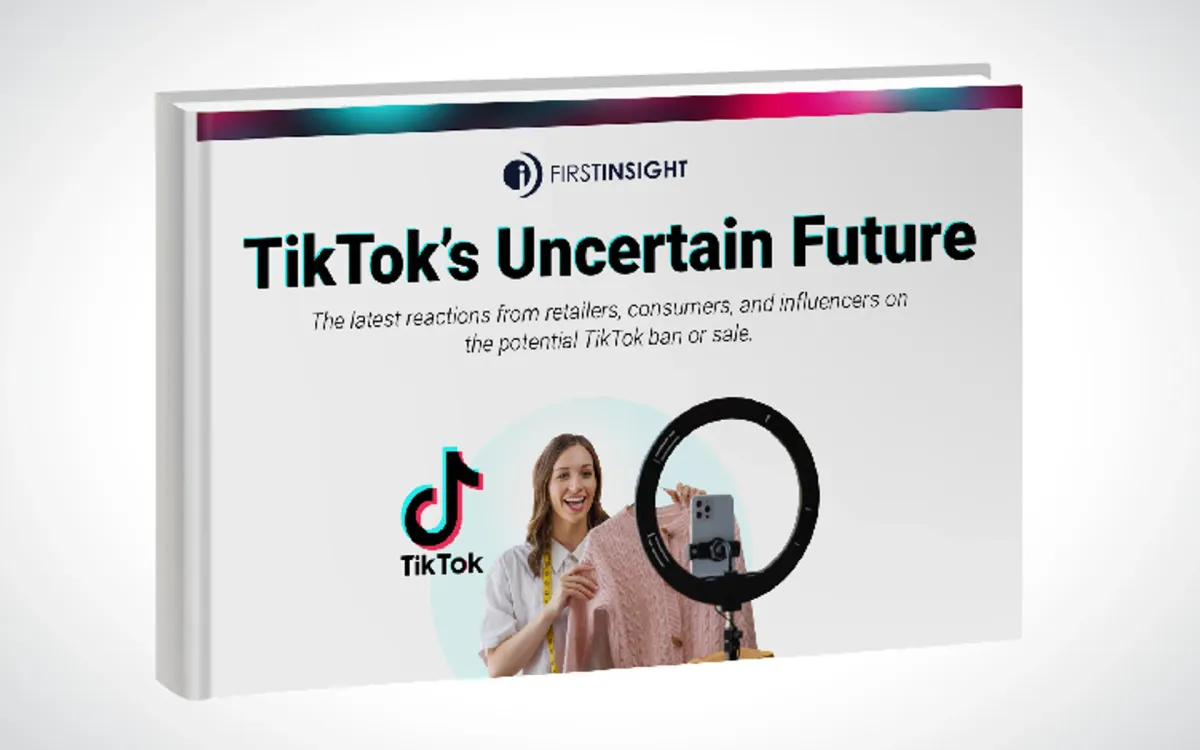
First Insight, a retail analytics firm, released a comprehensive report titled TikTok's Uncertain Future, which sheds light on how the potential sale or ban of TikTok is influencing consumer behavior and retailer strategies. The report, based on surveys conducted in May and August 2024, reveals significant findings about the impact of TikTok's uncertain status on the retail industry and consumer habits in the United States.
First Insight's report comes at a crucial time when TikTok's future in the U.S. market remains uncertain due to ongoing regulatory scrutiny. The popular short-form video platform has become a significant player in product discovery and e-commerce, making its potential disappearance a matter of concern for both retailers and consumers.
According to the report, 68% of retailers believe that a TikTok ban would impact their business and conversion rates. This high percentage underscores the platform's importance in the current retail landscape. However, despite this acknowledgment, only 28% of retailers have developed contingency plans to address the potential loss of TikTok as a marketing and sales channel. This lack of preparedness could leave many businesses vulnerable to disruptions in their marketing and sales strategies.
The report highlights TikTok's significant influence on consumer purchasing decisions, particularly during the holiday season. A striking 73% of consumers surveyed plan to use TikTok as inspiration for their holiday shopping. Moreover, 59% of consumers intend to make purchases directly through TikTok Shop, the platform's integrated e-commerce feature. These statistics demonstrate TikTok's growing role not just in product discovery but also in facilitating direct sales.
Retailers' reliance on TikTok is further emphasized by the fact that 81% of surveyed retailers use the platform to sell directly to consumers. However, this reliance comes with its challenges. Nearly 70% of retailers have experienced stockouts and delays due to viral content on the platform. The phenomenon of "TikTok made me buy it" moments, where products suddenly gain popularity due to viral videos, has created unpredictable demand spikes that many retailers struggle to manage.
In the event of a TikTok ban, the report indicates a significant shift in advertising spend and consumer attention. Facebook emerges as the primary beneficiary, with 82% of retailers planning to increase their advertising spend on the platform if TikTok is banned. This shift aligns with consumer and influencer expectations, as 39% of consumers and 40% of influencers named Facebook as the platform where they would spend the majority of their time in TikTok's absence. Instagram follows closely as the second choice for both groups, with 32% of consumers and 33% of influencers indicating it as their preferred alternative.
The potential shift in consumer behavior is already becoming apparent. According to the report, 64% of influencers have noticed changes in consumer engagement patterns, with increased activity on other platforms. This early indication suggests that consumers may be preparing for a post-TikTok landscape sooner than many retailers anticipate.
Greg Petro, CEO of First Insight, emphasizes the urgency for retailers to develop contingency plans. He states that retailers risk losing a powerful product discovery platform if TikTok is shut down. With over two-thirds of consumers discovering products on TikTok that they later purchase elsewhere, the platform's importance in the consumer journey cannot be overstated.
The report's findings underscore the need for retailers to be more proactive in monitoring and adapting to shifts in consumer attention and preferences. Relying solely on historical trends or assumptions in this rapidly changing digital landscape could lead to missed opportunities and costly mistakes. First Insight suggests that integrating AI-driven, Voice-of-Customer (VoC) data into planning processes can help retailers make more informed decisions about influencer partnerships, pricing strategies, and marketing spend allocation.
The methodology behind the report combines two surveys. The first, conducted in May 2024, gathered responses from 185 U.S. retail decision-makers through First Insight's InsightSUITE platform. The analysis focused on feedback from management in merchandising, marketing, and consumer insights at retailers and vertically integrated brands offering apparel, footwear, and home décor items. The second survey, conducted in August 2024, collected data from highly engaged TikTok users, providing insights into consumer and influencer perspectives.
First Insight's report serves as a wake-up call for retailers who have yet to consider the potential implications of a TikTok ban. It highlights the need for diversified marketing strategies and the importance of understanding where consumers will shift their attention if TikTok becomes unavailable. As the retail landscape continues to evolve with the rise and fall of digital platforms, the ability to quickly adapt to changes in consumer behavior will be crucial for business success.
Key facts
- Release date: August 28, 2024
- 68% of retailers believe a TikTok ban would impact their business
- Only 28% of retailers have contingency plans for a TikTok ban
- 73% of consumers plan to use TikTok for holiday shopping inspiration
- 59% intend to make purchases through TikTok Shop
- 81% of surveyed retailers use TikTok for direct-to-consumer sales
- 70% of retailers have experienced stockouts due to viral TikTok content
- 82% of retailers plan to increase Facebook ad spend if TikTok is banned
- 39% of consumers and 40% of influencers would shift to Facebook post-ban
- 64% of influencers have noticed shifts in consumer behavior across platforms
- Survey methodology: 185 U.S. retail decision-makers in May 2024, consumer and influencer survey in August 2024

